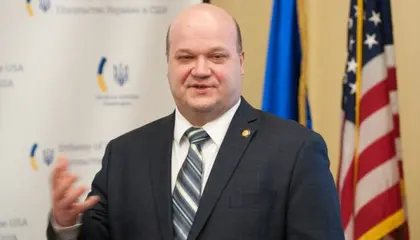The US government shutdown drama and House Speaker’s sensational ousting has shaken political circles in Ukraine and around world.
Given the approved temporary government funding bill, which does not include new aid to Ukraine, certain doubts arose as to whether there is consensus in the US about further support of Ukraine in its fight against Russia.
JOIN US ON TELEGRAM
Follow our coverage of the war on the @Kyivpost_official.
Moreover, Joe Biden publicly admitted he was concerned about "critically important" aid to Kyiv, since Congress remains without a leader.
To find out what might happen next with the decisions on US aid to Ukraine, how the Ukrainian government can influence this process, and what Russia will do, Kyiv Post spoke with the Ambassador Extraordinaire and Plenipotentiary of Ukraine, Chairman of the Board of the Ukraine Crisis Media Center Valeriy Chaly, who also held the post of Ambassador of Ukraine to the United States in 2015-2019.
Mr. Chaly, how can recent events in the United States affect US aid to Ukraine?
It depends on how the situation develops further. The first option is that the work of the House of Representatives will be unblocked. Then, most likely, it will be possible to enact a separate law on the provision of military-technical assistance to Ukraine that would be adopted.
The effect of this law, how it would influence the amount and timeline of aid, would depend on when it is enacted Now it’s time that plays an important role.

IMF Approves $1.1 Billion Loan Disbursement to Ukraine Before Trump Inauguration
Why does time play such a role?
A lot depends on what fills the information space during the break before the full-fledged work of the House of Representatives is continued.
Obviously, during this time, Russia will try to put out its narrative to the whole world that the US won’t be able to help Ukraine the same way as before.
How long will it take Congress to resume full-fledged work?
I think that the Republicans [they have the majority in the House of Representatives – ed.] won’t be able to quickly overcome their internal split, which caused McCarthy's resignation. In my opinion, the US will face a legislative crisis. It will most likely last for at least several weeks.
There is, of course, the possibility of a cross aisle vote of Democrats and Republicans [for the new speaker of the House of Representatives – ed.] that would quickly overcome this crisis. However, it is unlikely as they probably won’t find common ground.
What should Ukraine do in this situation?
Our [Ukraine’s – ed.] task is to ensure that the supply of weapons to Ukraine does not become a bargaining chip in the internal struggle in the United States. The main thing now is that the military-technical assistance to Ukraine and the supply of weapons do not depend on the political turbulence in Washington.
What does US aid look like now? What exactly does the crisis in Congress affect?
Until now, we have received aid from the United States under several programs. These are the USAI (Ukraine Security Assistance Initiative) program, the FMF (Foreign Military Financing) program, and the PDA (Presidential Drawdown Authority) mechanisms.
USAI and FMF are funds whose amount and conditions are approved by Congress. Here, the speed and amount of assistance will be determined only after the restoration of the full-fledged work of the US Congress.
Under the PDA, the US president can take resources from the Pentagon’s weapons storage as seen fit.
According to the information I have, the balance of these funds now amounts to about $1.6 billion specifically for armaments, while in general more than $5 billion remain for various other programs. These funds can be used right now.
However, separate legislation will be needed to restore or increase funding for the USAI and FMF programs for the 2024 fiscal year.
There is also another option. The National Defense Authorization Act has already been passed in the Senate and the House of Representatives, and conference committees are reconciling the bills approved by each house.
The president could sign this bill as soon as it gets to his desk, not in December, like last year [when Biden signed the military budget. After the joint House and Senate committees finish the bill each house of Congress would need to approve the reconciled legislation. So, the timing is based on those committees and the subsequent votes in each house of Congress. – ed.].
This law for 2024 contains Section 1224, which extends the Lend-Lease Act for Ukraine passed last year and signed by the US president on May 9.
That is, it seems to me that this is the time when this opportunity could be used [for the uninterrupted provision of aid to Ukraine - ed.].
Can Ukraine influence this?
Ukraine can behave constructively, show readiness to seek real mechanisms for solving the problem.
For example, on behalf of the government, it can submit a draft of a bilateral Ukrainian-American agreement on the use of the Lend-Lease Act for the supply of weapons. In my opinion, the draft agreement should be already prepared and ready for signing.
As soon as Biden signs the defense budget and the Lend-Lease Act is extended, the governments will have to sign this agreement and begin lend-lease deliveries.
Perhaps this will happen in small amounts, but it is necessary to show that there is an alternative option for providing aid to Ukraine, without the participation of Congress.
What is the plan if the work of Congress is quickly unblocked?
If the House of Representatives passed a separate law to give aid to Ukraine for tens of billions of dollars in other legislation, then perhaps this won’t be necessary.
However, it seems to me this should be done precisely to give everyone the right signal, in particular, for the Kremlin, that the US is not stopping aid to Ukraine.
This would be one of the options [filling the informational "pause" until the work of Congress is unblocked - ed.].
Another step [from the US – ed] in this context would be deciding to provide Ukraine with ATACMS right now.
Will this be a decisive factor in deciding on further assistance to Ukraine?
Providing ATACMS will be a clear signal to Moscow that even in conditions of certain turbulence in Washington, the provision of aid will not stop, and a group of radical congressmen will not be able to block this process.
Moreover, we need to discuss the option with our partners in the Ramstein format that during the period of political instability in the United States, weapons and military equipment should come more actively from other countries. That is, now new packages from European countries could fill this “pause.”
You can also highlight the text and press Ctrl + Enter






